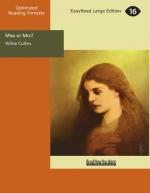So the average ignorance of human nature, and the average belief in conventional sentiment, complacently contemplated the sacrifice of one more victim on the all-devouring altar of Marriage! So Sir Joseph and his sister provided Launcelot Linzie with the one argument which he wanted to convince Natalie: “Choose between making the misery of your life by marrying him, and making the happiness of your life by marrying me.”
“When shall I see her?” asked Turlington, with Miss Lavinia (in tears which did her credit) in possession of one of his hands, and Sir Joseph (in tears which did him credit) in possession of the other.
“She will be back to dinner, dear Richard. Stay and dine.”
“Thank you. I must go into the City first. I will come back and dine.”
With that arrangement in prospect, he left them.
An hour later a telegram arrived from Natalie. She had consented to dine, as well as lunch, in Berkeley Square—sleeping there that night, and returning the next morning. Her father instantly telegraphed back by the messenger, insisting on Natalie’s return to Muswell Hill that evening, in time to meet Richard Turlington at dinner.
“Quite right. Joseph,” said Miss Lavinia, looking over her brother’s shoulder, while he wrote the telegram.
“She is showing a disposition to coquet with Richard,” rejoined Sir Joseph, with the air of a man who knew female human nature in its remotest corners. “My telegram, Lavinia, will have its effect.”
Sir Joseph was quite right. His telegram had its effect. It not only brought his daughter back to dinner—it produced another result which his prophetic faculty had altogether failed to foresee.
The message reached Berkeley Square at five o’clock in the afternoon. Let us follow the message.
FIFTH SCENE.
The Square.
Between four and five in the afternoon—when the women of the Western regions are in their carriages, and the men are at their clubs—London presents few places more conveniently adapted for purposes of private talk than the solitary garden inclosure of a square.
On the day when Richard Turlington paid his visit to Muswell Hill, two ladies (with a secret between them) unlocked the gate of the railed garden in Berkeley Square. They shut the gate after entering the inclosure, but carefully forbore to lock it as well, and carefully restricted their walk to the westward side of the garden. One of them was Natalie Graybrooke. The other was Mrs. Sancroft’s eldest daughter. A certain temporary interest attached, in the estimation of society, to this young lady. She had sold well in the marriage market. In other words, she had recently been raised to the position of Lord Winwood’s second wife; his lordship conferring on the bride not only the honors of the peerage, but the additional distinction of being stepmother to his three single daughters, all older than herself. In person, Lady Winwood was little and fair. In character, she was dashing and resolute—a complete contrast to Natalie, and (on that very account) Natalie’s bosom friend.




